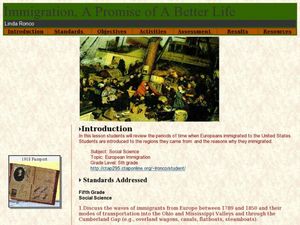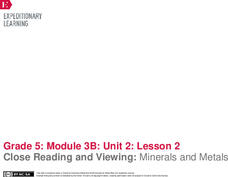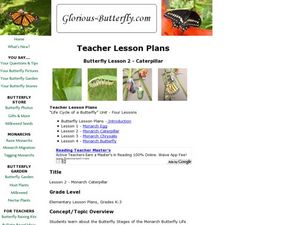Curated OER
Immigration - A Promise of Better Life
What a great way to discuss European immigration in the 1700's to 1800's in America. Learners identify regions where immigration occurred, list the reasons people moved to the United States, and interview an immigrant about their...
Forest Foundation
Exploring Heat & Energy
How does fire keep itself going? Explore the ways that heat uses fuel and energy with a lesson about the fire triangle and combustion. Several activities demonstrate how heat moves from warmer objects to cooler objects, as well as the...
BioEd Online
Muscle Fibers
What better way to learn about muscle than by dissecting one? Using cow muscle (beef), learners compare bundles of yarn to muscle fibers as they explore each. The supplemental reading about astronauts losing muscle mass in space and what...
Curated OER
The Water Cycle
Your class sets up a mini water cycle model to examine the process. Then they watch an animation, following a water molecule through the cycle. A well-developed lab sheet guides learners through the lesson and a PowerPoint presentation...
Curated OER
Water in Earth's Hydrosphere
Environmentalists test stream water for temperature, pH, and turbidity. Each group shares their information and then the class makes an overall evaluation of the water quality. A slide show sets the backdrop for the teaching portion and...
San Francisco Public Utilities Commission
Water from the Well
How much water does it take to brush your teeth? How about to wash your clothes? Perform an experiment that measures water usage in everyday tasks and compares them to the days before indoor plumbing, specifically the California gold...
S2tem Centers SC
Seasons
Winter, spring, summer, and fall—take the learning of the seasons beyond the elementary level to the middle school classroom. Curious learners begin by watching videos about the seasons and the rotation of planet Earth. Then, they...
Messenger Education
Mission: Possible—How Can We Plan an Exploration of Another World?
An astronaut's spacesuit weighs 280 pounds and takes 45 minutes to put on — that's a serious suit! The second activity of a three-part series allows pupils to see all that goes into space exploration. Through simulations, groups analyze...
Chicago Botanic Garden
Plant Phenology Data Analysis
Scientists monitor seasonal changes in plants to better understand their responses to climate change, in turn allowing them to make predictions regarding the future. The last activity in the series of six has scholars analyze BudBurst...
Towson University
Case of the Crown Jewels
Can your biology class crack the Case of the Crown Jewels? Junior forensics experts try their hands at DNA restriction analysis in an exciting lab activity. The lesson introduces the concept of restriction analysis, teaches pipetting and...
ReadWriteThink
Webcams in the Classroom: Animal Inquiry and Observation
Boost observational skills with an inquiry-based lesson that takes scholars on a virtual field trip. With help from webcams, learners observe animals in a zoo or aquarium. Observations go into a journal and a discussion is held to review...
NOAA
Journey to the Unknown
Go where no one has gone before. Learners experience what it is like to be a scientist exploring new territory. Using audio and a scripted text, pupils take a trip in the depths of the ocean. They follow their trip with a hands-on...
National Wildlife Federation
Plastic in the Sea
How much plastic do people use? Class members identify how plastic is involved in their daily lives by looking at food packaging either at a grocery store or at home. Learners view statistics for the amount of plastics found on a beach...
University of Minnesota
Manduca sexta Wax Model
Caterpillars' and moths' most obvious change is physical, but what happens to their nervous systems as they complete metamorphosis? Through a hands-on investigation, young scholars construct the nervous system of a caterpillar. They then...
University of Southern California
Mastering Microbes
Small but mighty! Learners explore the role of microbes in a healthy ecosystem. An engaging lesson asks pupils to design an aquaponics system that demonstrates that healthy microbes are necessary to maintain the ecosystem.
National Woman's History Museum
Hedy Lamarr, An Inventive Mind
Hedy Lamarr led a double life. Best known as an actress, Lamarr was also a brilliant inventor, responsible for the technology found in Wi-Fi, GPS, and Bluetooth. After studying primary and secondary source materials, groups conduct an...
Alabama Wildlife Federation
Bloomin' Butterflies
Get an up close and personal look at the metamorphosis of the butterfly. Pupils take ownership of their learning by collecting butterfly eggs, building a cage, and raising them to adulthood. The lesson plan resource provides instructions...
Aquarium of the Pacific
Kelp Forest Conservation
There otter be a better way. As a class, groups work together to create a food web based on the organisms in the kelp forest. Budding scientists watch a video on the kelp forest to see how the organisms create a food web and hear about...
EngageNY
Close Reading and Viewing: Minerals and Metals
How easy is it to live off the land? Scholars read Minerals and Metals in Your Life and discuss how Canada's natural resources meet the needs of the people. Pupils watch a brief video and discuss the gist of the text and video. They then...
Curated OER
Butterfly Lesson 2 - Monarch Caterpillar
Students study the Monarch Butterfly life cycle. In this Monarch Butterfly lesson, students examine what happens prior to a caterpillar hatching, how often it sheds its skin, and what the caterpillar goes through when it is preparing to...
Curated OER
The Race
Young scholars play game simulating route turtle hatchlings take from clutch to ocean, and describe threats hatchlings face and how this affects the marine turtle population.
Curated OER
Kure Waste Chase Game Lesson
Students work together to identify marine debris. They explain the effect of the debris on various ecosystems. They draw different types of ocean currents as well.
Curated OER
Water, Water Everywhere (Pond Animals)
Second graders examine the characteristics of animals who live in a pond environment. In groups, they describe the various stages in the life of a frog and identify the characteristics of other pond animals. Using this information,...
Curated OER
Implications of the Human Genome Project
Learners study the Human Genome Project through classroom discussion and the video, Cracking the Code of Life. They research reports about the issues of disease, human health, and the ethical, legal, and societal implications of the...
Other popular searches
- 4th Grade Life Science
- Life Science Inquiry
- Life Science Vertebrates
- Life Science Experiments
- K 2 Life Science
- Life Science on Cells
- Life Science Lesson Plans
- Grade 4 Life Science
- Life Science Report Topic
- Australia Life Science
- The Life Science
- Life Science Lessons

























